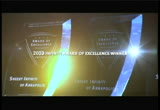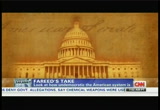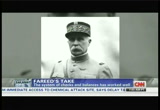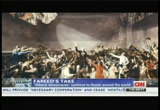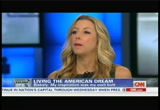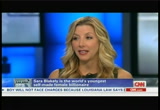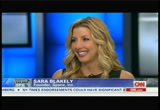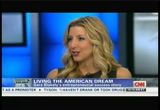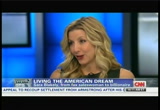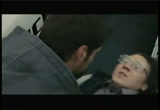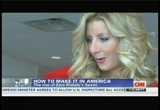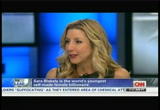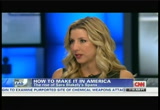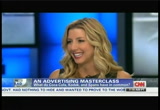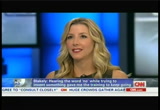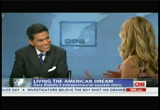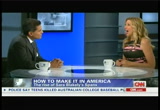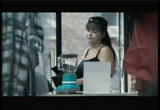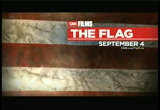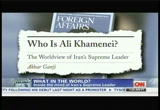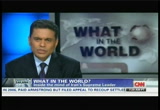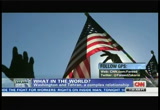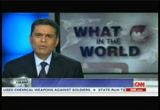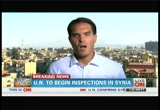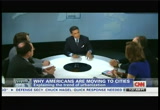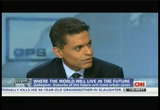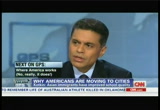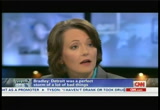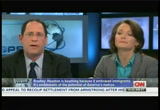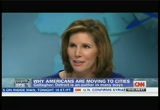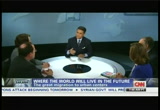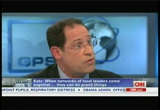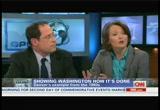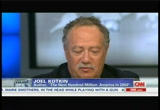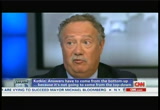tv Fareed Zakaria GPS CNN August 25, 2013 10:00am-11:00am EDT
10:01 am
this is "gps" the global public square. welcome to all of you in the united states and around the world. i'm fareed zakaria. we have a great show for you today. first up, we will talk about women's undergarments. seriously. spanx founder sara blakely is the world's youngest self-made female billionaire. her story is an only in america story and it is an amazing tale of entrepreneurship. you don't want to miss this. then, a big question that affects us all. for the first time in history, a majority of human beings now live in cities. what does that mean? more skryscrapers and congest 8? more detroits? we will look at the upsides and the downsides of an ever more urban world. we have a terrific panel that has some surprising ideas. also les miserables. it turns out that the book by victor hugo is the all-time favorite novel of a middle
10:02 am
eastern leader that the west counts as an enemy. i will explain. but first here's my take. we are watching a season of discontent in the world of young democracies. from egypt to turkey to brazil, protests, marches and, of course, one coup. as we watch the turbulence around the globe, i think about our own democratic journey and how interesting it is that the distinctive feature of the american system is not how democratic it is but rather how undemocratic it is. hear me out. we have three co-equal branches of government and the one with the final say on many issues, the supreme court, is composed of nine unelected men and women. the american senate is the most unrepresentative upper house in the democratic universe with the exception of britain's house lords, which is utterly powerless. california's 38 million people have the same representation in the senate as do by only's
10:03 am
576,000. state and local governments battle federal power. private businesses and other nongovernmental groups are also part of this mix. now, there are aspects of this system that many americans don't like. i think the senate in general is a broken institution from its representation to its absurd rules about filibusters. but the system of checks and balances as the famous phrase goes has in general worked well. the form of government that came out of the french revolution, by contrast, is one of absolute sovereignty. centralizing all powers at the top. since that revolution, france has had many upheavals and changes in regime, going through two monarchies, two empires, one cryptofascist dictatorship and five rep ix. the united states has had a continuous constitutional existence. why is this important as we look at the world today?
10:04 am
well, in so many of these cases, what we are watching are democratic governments elected freely and fairly that are abusing individual rights, ignoring minority parties and eroding checks and balances. observing the early flowering of this phenomenon in the mid-19 s mid-1990s, i described it as ill liberal democracy and this is the problem we confront in the arab world and so many other developing countries. the good news is that other elements within society are fighting against this kind of illiberal democracy. political groups, student movements, even the clash between the egyptian military and the muslim brotherhood could be useful in the long run because it resembles the clashes between kings and lords, the church and the state, the aristocracy and the eleets. it can look very messy while it's happening. neither side hasnopoly of
10:05 am
virtue. but it does help create a system of checks and balances. so what we're watching might look like crisis and breakdown, but it might turn out to be the road to better government. for more on this, go to cnn.com/fareed and you can read my essay, "the rise of illiberal democracy." anyway, let's get started. if you think the american dream is dead, just meet sara blakely. she's never taken a business class or even worked in her industry, but she is not an accidental entrepreneur. the tenacious blakely transformed $5,000 in savings into a $500 million a year company called spanx, and she revolutionized women's undergarments in the process. in 2012 "forbes" magazine named the spanx founder and inventor the world's youngest self-made
10:06 am
female billionaire. her brand can now be found in over 50 countries worldwide, but blakely's story is quintessentially american. as with many inventions, it all began as a solution to a nagging problem. listen in. sara blakely, great to have you on. >> thank you for having me. >> so explain where you get the idea to make this new kind of underwear. >> well, my inspiration for spanx was actually my own butt. so i don't know if this has ever happened to you, fareed, but i could not figure out what to wear under my white pants. like so many consumers out there, we have these clothes that we can't figure out what to wear under them of the and so the panties show the panty line and the shapers were too thick and bulky, so my cutting the feet out of my control top panty hose i realized this hosary material would make good
10:07 am
undergaurmentes and shapers hidden under the clothes that smooth us out, get rid of the panty line and spanx filled this niche between two options of undergarments that neither one were quite right for women and revolutionized the way we got to wear our clothes. >> so you had these white pants. how did you actually come to this conclusion? what did you do that made it work? >> well, i went shopping for shapers and i -- the thong and the panty didn't work because you could see the lines. the shapers were thick. so i cut the feet out of my own control top panty hose and put them on under the pants and everything looked smooth and perfect and no lines but they rolled up my legs all night. so i went home that night and thought i have to figure out a way to comfortably keep this product just below the knee with a soft knitted band and i'll have something for not only myself but for many, many women. >> and so what's going on in your life at this point? where are you? >> how rock bottom was i? at that point in my life i had always wanted to be a lawyer and
10:08 am
had failed the lsat. i'm not a good test taker. so then that led me to try out to be goofy at disney world, but you have to be 5'8" and i'm only 5'6". so i worked at disney world for three months and then i sold fax machines door to door for seven years. that's what was going on in my life. i had never taken a business class, i've never worked in fashion or retail, but i knew that i wanted to be self-employed. i had really been visualizing that. i had been manifesting that. i was very clear with my intentions that i wanted an idea. and if the universe gave me the idea, i would take it and run with it and create it on my own and sell it, because i knew i could sell fax machines. i didn't really like fax machines or half the time understand them, but if i could come up with that idea that i was excited about, then i would not waste it. >> so you've got the idea. you've done some research. now you've got to get somebody to make the prototype. how do you do that? >> yes. so after i cut the feet out of my panty hose, i went -- i did
10:09 am
two things right away. when you have an idea, the first thing i did was go to uspto.gov which is the united states patent and trademark office website and i searched if there was a footless body shaping panty hose already in existence. >> you can search that? >> yes, you can. you can look for patents. i found that there wasn't one. then the other thing i did was i went to another website called thomasregister.com which lists all the manufacturers in the united states by product. so i typed in shapers or undergarments and i got my list of manufacturers and i started calling them on the phone. >> cold call. >> cold calling them. which i was pretty good at because i had been doing it for seven years so hearing the word "no" did not faze me. i heard no for the first two years of trying to get the product made. >> and then how did you get it made? >> well, i realized that everybody who i was calling, you know, i was just being transferred eternally. it's like here's this girl online saying she's going to
10:10 am
transform people's butts and chamber of commer change the world. i got lost in the scuffle. so i took a week off work and drove to north carolina and cold called all the mills that had been hanging up in me and begged in person to help make my idea. they all sent me away. it was probably two weeks to three weeks after that road trip that i got a call from a mill owner in charlotte, north carolina. and he said, quote, sara, i've decided to help make your crazy idea. >> so this guy -- and this is southern -- a clothing manufacturer, right? >> yes. >> so why does this one guy decide to do it? >> well, i asked him that. i said why the change of heart? and he simply said i have three daughters. and so thankfully for me, my passion and enthusiasm for this idea had him run it by his daughters at dinner. and they said, dad, this is actually a really good idea. you have to help this girl make it. so he called me up and gave me a shot to make it.
10:11 am
but still not thinking it was a good idea. i think he was just really more wanting to help me out. >> so you've got -- now you've got somebody to make the product. you still have to figure out how to patent it properly. >> yes. >> how to actually manufacture it in large quantities, how to sell it in the market. >> yes. so the patent, once i did my own search and realized there wasn't something out there like that, i then went to three different lawyer that say i looked up on the internet in atlanta and presented my idea. they all wanted between $3,000 and $5,000 to patent the concept. i had $5,000 set aside in my savings to do this. so i ended up going to barnes & noble and bought a book on patents and trademarks. i wrote my patent and i went back to the lawyer who actually admitted he thought my idea was so bad that he thought i had been sent by "candid camera" that his friends set me up to do this for him but he said i'll do
10:12 am
this for $700 over the weekend which was the legal portion of the patent i didn't have the training to write. i had already written the abstract and done the drawings. so we did that and i submitted that. then the panckaging, i was makig on my friend's computer. >> all right. so you've got the prototype and the patent. we're going to come back and figure out how this story ended. you know how it ended, but you still want to listen when we come back.
10:14 am
10:16 am
failure is life's way of nudging you on to another path. it's a philosophy spanx founder sara blakely has cashed in on. as a child she used to watch her attorney father in court, but that wasn't enough to keep her from bombing the lsats twice, failing to get into law school set her on a path to selling fax machines door to door for seven years. that made blakely immune to rejection, which was invaluable when she started cold calling hosiery mills with her footless panty hose idea. for two years blakely worked eight-hour days selling fax machines and developing spanx after hours. she didn't quit her job until he invented the product, wrote the patent, started the website and landed neiman marcus and saks
10:17 am
fifth avenue as customers. here's more of my conversation with the billionaire entrepreneur, sara blakely. >> so you were telling us about how you finally got the prototype and the patent. >> yes. >> but there was one little detail that i know from talking to you that you didn't mention when you got the patent. so the night before the patent is going to be filed, you get nervous because the guy who made the prototype explained what it was made of. tell that story. >> so my lawyer suggested we get on a three-way call with the man in the back of the manufacturing plant that had really helped me make my first prototype. and he was extremely southern. and we got on the conference call and i said, ted, you need to explain to sam what's in this product. so he says, well, it's 70% nylon and 30% lacquer. my attorney and i are taking notes and i said, okay, thanks.
10:18 am
the night before i could not sleep because all night i'm thinking how is there lacquer in this product, in this shaper. so i called ted the next morning and i said, ted, this is sara. can you please spell lacker. and he said, yeah. l-y-c-r-a. i went oh, my god, lycra. okay, thanks. i called my attorney and said you've got to do an all change on lacquer, it's laycra. >> so now you've got the patent and the prototype. what happens next? >> i needed to name it and i needed a package. so i created the package on my friend's computer with her help. i wanted my packaging to be very different. i made it red, which hadn't been done in the hosiery space. i did three cartoon women that are very different-looking. for many years it was the same half-naked woman in photography on all of our packages, it was
10:19 am
very confusing. and so that stood out because i knew if i got my chance on the self, i didn't have the money to advertise so it needed to jump off and sort of say i'm new and check me out. >> what about the name? >> and then the name spanx came to me after a year of really bad names that i would write on scrap pieces of paper every where. i narrowed down my thinking because i knew kodak and coca-cola were the two most recognized names in the world. what do they both have in common? they both have a strong k sound and my friends who are stand-up comedians know it's a trade secret that the k sound will make their audience laugh. then i did research the man who did kodak put it at the beginning and end. so i want my invention to have k in it so spanx came to me sitting in traffic in atlanta. that night i went home and for $150 with my credit card trademarked it on the government website. and right before i hit send i
10:20 am
changed the ks to an x because i felt it would be easier to trademark and more memorable. >> so you're doing this all on your own. you're going on the web and you didn't have -- you never went to business school, nothing. >> no. i've never taken a business class in my life. i never worked in fashion or retail. so i was a consumer that loved my clothes and wanted to look better in them and also just, you know, someone who had been selling fax machines door to door. so hearing the word "no" through the process of trying to invent and create something, i had the training to just keep going. >> you also said once that you thought that your lack of knowledge about the fashion business helped you. you managed to get it in neiman marcus and everyone thought this was incredibly difficult. explain how you got into neiman marcus. >> i always like to tell people that what you don't know can be your greatest asset if you let it. if you have the confidence to let that be your asset. because i had no idea what i was doing. in most cases it worked to my
10:21 am
favor. if you don't know what you're doing or how it's supposed to be done, you're going to end up doing it different than everybody else and that's what makes great companies and great products. so with neiman marcus, the very minute i invented the product and sitting in my apartment with my first prototype. i had a color copy of the packaging, i called neiman marcus around the corner and said hi, i'm sara, i invented a product, can i show it to you. they laughed and said there's a buyer in dallas. i called her and said i invented the product that will change the way your customers will wear their clothes, i'll fly there. she said if you're willing to fly here, i'll give you ten minutes. so i went to neiman marcus and pitched it. i was so nervous in the middle of the meeting i actually said you've got to come with me to the bathroom. she's like excuse me? i said just come with me. i did my own before and after. she said it's brilliant, i get it. i'm going to try it in seven stores. all these other people come up and say how in the world did you get your product in neiman's? i would say i called them.
10:22 am
and the look on their face. i said why, what do you do? they said there's trade shows and we set up booths and we've done this for seven years hoping they would come to our booth. and i didn't even know there were trade shows. so a lot of it is i had no idea how it was supposed to be done. >> what are your sales? >> i'm privately held. i hold 100% of the business. i started out with my $5,000 savings. our retail sales are well over $500 million. and so we're doing great. a lot of butts in the world to cover. >> so what do you think, when you look back at this, you have no business training, you have no business education. what do you think was the key to your success? >> i would have to say one of the biggest keys to my success was my upbringing and my father. and he was very determined growing up to encourage me to
10:23 am
fail. >> encourage you to fail? >> yes. so my dad at the dinner table, he would ask my brother and me what we had failed at that week. if we didn't have a story to tell him, he would actually be disappointed. i can distinctly remember coming home saying dad, dad, i tried out for this and i was horrible. he'd high five me and say way to go. and so what happened was he reframed my thinking on failure. so failure for me became not trying versus not succeeding. and i think more than anything what stifles entrepreneurship and this risk-taking that all these people are sitting on million dollar ideas is the fear of failure. and so that was a real big gift i got from the way i was raised was not to fear that. >> well, clearly you've managed to take it and so very far. >> thank you. >> sara blakely, pleasure to have you on. >> thank you, fareed. up next, what in the world. a powerful leader in the middle east who loves western novels. who is he and why is it important? vo: two years of grad school.
10:24 am
20 years with the company. thousands of presentations. and one hard earned partnership. it took a lot of work to get this far. so now i'm supposed to take a back seat when it comes to my investments? there's zero chance of that happening. avo: when you work with a schwab financial consultant, you'll get the guidance you need with the control you want. talk to us today. we replaced people with a machine.r, what? customers didn't like it. so why do banks do it? hello? hello?! if your bank doesn't let you talk to a real person 24/7, you need an ally. hello? ally bank.
10:28 am
world" sg meant. one of the most powerful leaders in the world once said thing for. victor hugo's les miserables is the best novel that has ever been written in history. i have said over and over again go read it once. "les miserables" is a book of sociology, a book of history, a book of criticism, a divine book, a book of love and feeling. who said those words? it is not the president of france. in fact it's not any western leader at all. those are the words of a man the west has come to perceive as a sworn enemy. ali khamenei, the supreme leader and ayatollah of iran. this revelation is part of an important essay in the new edition of "foreign affairs" by the iranian dissident and writer. it turns out khamenei believes novels have given him a deep insight into the west. the supreme leader has read "the grapes of wrath" as well as
10:29 am
"uncle tom's cabin" and many other books around the world. it provides fascinating insights into the most powerful man in iran. remember, khamenei has been in power in iran since the beginning. when iran had its revolution in 1979 and iranians overthrew the american to form the republic, ali khamenei was at the forefront. he became president in 1981 and supreme leader in 1989 with full control over the military, executive and judiciary. the essay describes an iranian leader for what much of his early career was deeply highs tile towards the west and the united states. he was first and foremost a scholar of islam and its role in society. he was deeply influenced by the writings of kotuv.
10:30 am
he was prominent in the muslim brotherhood. he was a prolific writer on islam but also wrote about america as a nation offin principled and imperialistic people. khamenei has pointed out that iran's democratically elected government was not anti-american. in fact it looked to america for support as it tried to break free of a colonial relationship with great britain. but the united states and britain organized a coup 60 years ago this week actually. then came the american-backed regime for the shaw which was a western implant on society. the books he likes are all critiques of western society for the way it has treated the poor or african-americans or native americans. he does not, incidentally, seem to recognize the strength of a culture that criticizes itself. all these critiques of the west are by westerners, who often gain great fame for these efforts. in the portrait, khamenei as
10:31 am
softened somewhat in recent years. he has recently praised western culture for its science, innovation and even hard work. he still argues that islam is superior because in his view western culture is too focused on materialism, but he says that it too has its strengths and that iran could learn from them. khamenei seems a man who distrusts the west for reasons that seem to do with his reading of history, his schooling in political islam, and his own experiences in his country. on the other hand, the picture of him that emerges is of a clever, sophisticated, learned man who does not seem prone to rash decisions or impulsive actions. go to cnn.com/fareed to read this fascinating essay. up next, what a massive wave of urbanization will do to the world and america. i have a great panel of experts on cities. stay with us. ♪
10:32 am
♪ he's a 20-year-straight, get to work on time ♪ ♪ ♪ he's loved one woman for all his life ♪ ♪ ♪ everybody knows he ain't just tough ♪ ♪ he's strong [ male announcer ] the all-new 2014 chevy silverado. strong for all the roads ahead. [ male announcer ] the all-new 2014 chevy silverado. peace of mind is important when so we provide it services you bucan rely on.
10:33 am
with centurylink as your trusted it partner, you'll experience reliable uptime for the network and services you depend on. multi-layered security solutions keep your information safe, and secure. and responsive dedicated support meets your needs, and eases your mind. centurylink. your link to what's next.
10:35 am
10:36 am
places where chemical weapons were allegedly used here in the damascus suburbs on wednesday. he also said that syria categorically denies using chemical weapons on the battlefield. of course the opposition is saying that on wednesday, chemical weapons launched by the assad regime killed some 1300 people in several suburbs of the syrian capital. the u.n. for their part says that its investigators are going to go on the ground and start investigating, starting tomorrow. the u.s. places the blame squarely on the shoulders of the assad regime and they say this new recognition that the weapons inspectors are supposed to be allowed on the ground comes way too late. with that, back to "fareed zakaria gps." today more than 50% of the world's population lives in cities. by 2030, 60% will be urban. 70% by 2050. china alone is planning to move a quarter of a billion people from rural to urban areas by
10:37 am
2025. but this isn't a phenomenon happening just in emerging markets or third world countries. even in a country like the united states, there is already 80% urban. people are still moving to the cities at a rate of about 1% each year. what does all of this mean? i'm joined by a great panel to explore it. bruce katz and jennifer wrbradl from the brookings institution co-wrote the "metropolitan revolution." leigh gallagher is author of "the end of the suburbs" and joel kotkin is a distinguished fellow at chapman university and the author of "the next 100 million, america in 2050." welcome to you all. so do you find that when you look at the urban issues in america, are people going to cities for a reason or are they going away from suburbs? >> it's a combination of both. i mean what i document in my book is really a pretty
10:38 am
significant change of what people want from the communities they live in, the houses they live in and the way that they live every day. one trend that i'm documenting here is urbanization, which includes the resurgence of cities like new york, like cities all across america have more, you know, outdoor cafes and multi plexes. they're like amusement parks now. i think we've all witnessed that here in the u.s. but at the same time there's a real effort afoot to sort of urbanize the suburbs. the suburbs that will do well in the future will have urban cores. what i mean by that is just a place to get out of your car and walk, a place that's pleasing. there's a tremendous, tremendous yearning for that right now. much in the same way as years ago people yearned for their own yard and a picket fence and a car. >> joel, you say the suburbs aren't dead yet? >> obviously not. the vast majority of people that live in metropolitan areas live in suburbs. and certainly between 2000 and 2010, a huge percentage of the growth was in the suburbs. now, i agree with leigh that the
10:39 am
suburbs are changing, will have to change. i still think people want backyards. i still think they want single family homes. 80% want single family homes. but they will be looking for different things in suburbs. one of the great things about suburbs in america now is we're getting all the immigrants moving to the suburbs so the quality of the food has gotten much better. it's much more interesting. in certain areas they made the schools extremely good. particularly asian immigrants. the suburbs are changing but they're the predominant choice of the vast majority of people over their 30s and the vast majority of people who have kids. now, if we end up with a very, very low birth rate, that may tilt things more toward cities. >> the part that we haven't talked about when we talk about cities and suburbs is -- wait a minute, if cities are the future and even if it's the close-in suburbs, what about detroit? >> first of all, just to clarify, i think cities and suburbs together are the future. because we're a metropolitan nation. when we use the city globally, what we're really talking about
10:40 am
are these vast metropolitan areas. we're the most metropolitan. 84% of our people live in cities and suburbs. 91% of our gdp. so in a way we should be thinking about how cities and suburbs together power our economy forward. detroit, southeast michigan larger, has come back since the recession, right, thanks to the auto bailout. the city itself, though, in the core has been troubled for decades. 138 square miles lost from about two million in population in the '50s down to less than 750,000 today. it's an extreme case of urban decline. but even in detroit you can see in the core of the city a revival of anchor institutions like wayne state and henry ford health system, clusters of tech and creative firms like quicken loans. and philanthropies that are really betting on the future. so, you know, in america there's always a second act.
10:41 am
and we think, jennifer and myself, that as we talk about the fiscal challenges of detroit, we should talk about the assets and advantages of its core. because like many other metropolitan areas, that's where we see a good portion of what powers our country. >> so you would argue that the experience of detroit is about one badly manage d fiscal unit. even michigan can thrive, but detroit itself just managed itself for decades bad? >> i think detroit was a perfect storm of a lot of bad things. it's as if every bad thing that was going to happen to a city happened more intensity and more all at once than detroit. but i don't think it's emblematic of other places. if you look at a place like northeast ohio, which bruce and i talk about in our book kwrks the metropolitan revolution," cleveland, akron, canton,
10:42 am
youngstown, have been able to organize around their assets and figure out how to take the innovative capacity that's in their institutions like the cleveland clinic, akron health centers, find entrepreneurs who want to take that technology and commercialize it. so i actually think a place like a northeast ohio or a houston, which is booming because it's embraced immigrants and has said you're here to work and we want to help you start up the economic ladder. i think those places are much more emblematic of the power and potential of america's metros than detroit. >> what's your diagnosis of detroit? >> certainly there was just absolutely horrendous management. that's certainly one part. the other part with detroit is, on the positive side, is i just did a study on engineers. it has one of the highest concentration of engineers in the country. they happen to live overwhelmingly in the suburbs. they also have significant immigration as well. so i mean i think the detroit region is definitely saveable, and i think if the detroit
10:43 am
region comes back, i think detroit city may find its role within that region. >> detroit seems to be a story that's sort of in some ways opposed to your book and your thesis because it is a classic case where people left the city for the suburbs. you know, crime grew, it became a negative spiral. and the well-to-do white middle class and upper middle class just fled the city. they were doing fine, i suppose. in the outer suburbs, but the city itself imploded. >> it's sort of an outdated narrative. that was the path that everyone beat in the '50s and '60s and '70s. you had the white flight and everything. that's not happening anymore. i would agree with jennifer that detroit is in many ways an outlier. but one thing that's interesting about detroit is that it is a great model. planners are looking at it as a model of how to shrink. you know, nobody talks about shrinking in the planning world, but that is the proper response because you need to shrink the city to meet the demands of its
10:44 am
inhabitants because otherwise you have abandoned buildings and that just fosters more crime, it's not good for young children to see that growing up. >> we've got to take a break. when we come back, we'll ask how the left-right divide in the united states plays into all these urban issues when we come back.
10:48 am
we are back with bruce katz, leigh gallagher, joel kotkin and jennifer bradley talking about urban issues, urban america. and the one thing i'm struck by about your book, which i love but i want to ask you more about, is you say washington is broken. you know, nothing is working. but if you -- if you look beneath the hood of america, as it were, what you see is mayors and municipalities where people are reaching across party lines, working with the private sector and that there is a metropolitan revolution. and i guess my question is,
10:49 am
really isn't the -- when i watch republicans in albany and democrats, they seem as divided over everything as anybody else. >> a government is a government. states are governments. when we come to cities and metropolitan areas, what jennifer and i find are networks of leaders. elected officials for sure, mayors and county leaders, but also heads of major companies, business associations, universities, medical campuses, fran philanthropies, unions, community and civic groups. and when they come together, they can do grand things together. our book really is about that. it's in the absence of federal leadership, the cavalry is not coming, and frankly many state governments are the same. it's that head-to-head fight between the democrats and republicans. city and metropolitan leaders, these networks and many times across jurisdictions understand, you know, we're on our own. we're going to have to understand what we do in this
10:50 am
global economy and then build on our special assets, attributes. >> give me an example. >> one of the best examples of this is denver. in the 1960s and '70s, the city and suburbs in denver were under extreme pressure and they really didn't get along over anything. there were issues over race and bussing and urban expansion. they were really at each other's throats. then at the 1980s, the energy economy tanked in colorado and really socked the denver economy. and suddenly the business leaders said, you know what, it's not as if there's a magic circle around denver and that's where all the economic pain is concentrated. we're feeling it in aurora, we're feeling it in broomfield county, we're feeling it throughout the region, so we need a strategy that will help all of us. and they started this completely unheard of economic development way of doing business, which is they pitched the region as a region when they're trying to locate a global company. they say come to greater denver.
10:51 am
there's a lot of great stuff here. once you decided to come to the region, then you can work out whether you want to be in one jurisdiction or another, but they understood that economically they really were in it together. they don't have to agree on every single issue. the mayors don't get together at the mayors caucus meetings and sing kumbaya and roast marshmallows but they really do get that their prosperity is enough to share and they'll do better -- they can be a great world city if they operate together. and i think that's a great model. >> do you buy the basic story, though, of this kind of bottoms up. the way to look at america is not so much through the prism of washington but through these bottoms up revolutions that have taken place? >> as a father and basically an optimist, i have to look at it that way because if i looked at those clowns i would be very pessimistic. i go out into the field a lot, you know, reportingwise speaking and i am amazed at the energy that exists at the local level. and the ability of people to
10:52 am
tackle things. now, by the way, i think it's much harder in the bigger metros, the chicagos, the new yorks, the l.a.s, where they have gotten so big and there's so many -- everything is very politicized. but generally speaking, i think it's going to have to come from the bottom up because it's not going to come from the top down. and i also think the great advantage of america is that we have these different environments, you know. we can have the tech capital of the world be in the bay area and have the energy capital of the world be in houston and have the media capital in new york and entertainment be in l.a. and all these different regions and they can be run differently. i don't see why we have to say what works for new york works for dallas. they are very different places. and the more we allow these places to innovate in ways appropriate to them, the better off we'll be. >> last thought. >> somebody told me that suburbs have more in common with the cities they're attached to than other suburbs. we are a tremendous patch work and the suburbs have grown to reflect more of america in
10:53 am
general, which is a good and bad, everything that we have is now in our suburbs. so -- but there's dramatic shifts happening and we will wait until the next census to see how things really play out. >> fascinating and very optimistic discussion. coming up next on "gps" savvy travelers know that if you like paris empty now is the time to go. want a quiet paris all year round? i will tell you how and where to find it. this man is about to be the millionth customer. would you mind if i go ahead of you? instead we had someone go ahead of him and win fifty thousand dollars. congratulations you are our one millionth customer. nobody likes to miss out. that's why ally treats all their customers the same. whether you're the first or the millionth. if your bank doesn't think you're special anymore, you need an ally. ally bank. your money needs an ally.
10:54 am
peace of mind is important when so we provide it services yo . business. with centurylink as your trusted it partner, you'll experience reliable uptime for the network and services you depend on. multi-layered security solutions keep your information safe, and secure. and responsive dedicated support meets your needs, and eases your mind. centurylink. your link to what's next.
10:57 am
august is drawing to a close and that means back to work for much of the world. but let's stay on the beach for at least a few more moments. my question of the week is related. where in the world do workers have legal rights to the most paid time off? is it, a, france, b, the united states, c, austria, or d, portugal. stay tuned and we'll tell you the correct answer. go to cnn.com/fareed for more of the gps challenge and lots of insight and analysis. you can also follow us on twitter and facebook. also, remember you can go to itunes.com/fareed if you ever miss a show or a special.
10:58 am
this week's book of the week is two books of the week. i'm going to re-recommend a couple of books that i read this summer. the first is "wealth & power, china's long march to the 21st century." really smart look at china's history and its future. the other book is "the sleep walkers, how europe went to war in 1914" by christopher clark. new scholarship on how world war i began and just a wonderfully written book with important lessons. now for the last look. via the new -- look at the iconic brand boulevards. the only problem, the crowds of tourists are nowhere to be scene. that's common to the real paris this time of year, i suppose, but local media has dubbed this fake paris a ghost town all year round. this is tien duchang. 6,000 miles from the city of lights. a luxury development in the
10:59 am
outskirts of shanghai that was constructed to 2007 to attract china's new wealthy. but according to the developers, it is currently only 20% to 30% occupied. location, location, location is part of the problem. the luxury development sproutd in an area surrounded by farmland and dead-end roads. it is also a symptom of china's property bubble. ghost towns, even entire ghost cities are increasingly common sights in china. in this case, it seems instead of going to fake paris, the chinese are going to the real city of lights. 1.4 million chinese visited france last year, a 23% increase from 2011. the correct answer to our gps challenge question was actually a tie. austria and portugal both grant their workers 22 days of vacation time plus 13 paid holidays for a grand whopping total of 35 paid days off. if you guessed the united states, you must not work here because u.s. worrs
220 Views
IN COLLECTIONS
CNN Television Archive
Television Archive  Television Archive News Search Service
Television Archive News Search Service 
Uploaded by TV Archive on

 Live Music Archive
Live Music Archive Librivox Free Audio
Librivox Free Audio Metropolitan Museum
Metropolitan Museum Cleveland Museum of Art
Cleveland Museum of Art Internet Arcade
Internet Arcade Console Living Room
Console Living Room Open Library
Open Library American Libraries
American Libraries TV News
TV News Understanding 9/11
Understanding 9/11